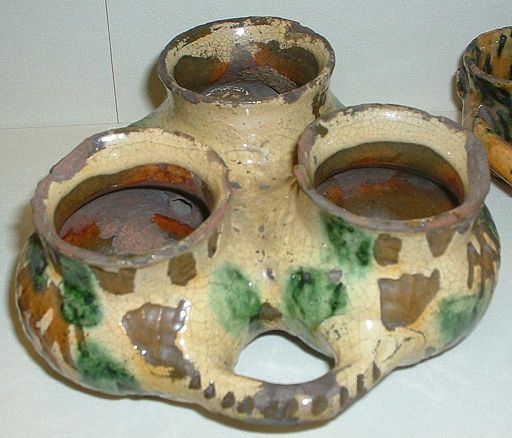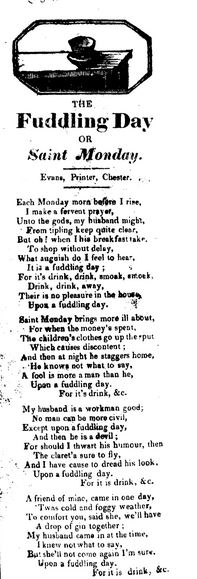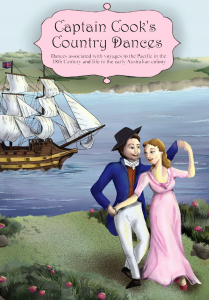…fuddling, fiddling, and dancing at the hour of 12 last night.
reported by the police. Sydney Gazette 1827
In 1827, three people – Catharine Boyles (free), Thomas Fellowes (prisoner), and a musician (a convict with a ticket of leave) were charged with fuddling, fiddling and capering at midnight. Read Catherine’s story

Although fuddling could be used as another term for drinking, the word originates from the drinking game especially popular in 17th and 18th century England. The fuddling cup was ingeniously designed as a puzzle to test the skill of each drinker. It was an earthenware vessel made of three or more cups joined together with the handles intertwined, and linked through the base by a series of holes. The challenge was to drink from one cup without spilling a drop from the others—a task that could seem impossible to the uninitiated. The knack lies in the specific order in which each cup is drained.
The challenge of the fuddling cup added to the allure of the taproom—laughter and amusement as each participant attempted to solve the riddle.
The cups provided amusement as well as a social function with the shared secret over something quite so frivolous building trust and friendship in difficult times. [1]
The circling glass
It’s not certain whether fuddling cups were imported or created in the colony, however, one thing is certain, drinking was an extremely popular activity. Leading historian of colonial life, Grace Karskens, writes that in the early colony “drinking belonged to an older, more communal realm of behaviour” where friends often shared a communal ‘circling’ glass [2]. The “fascination of the gaily circling glass”[3] helped to establish and strengthen friendships and deals for both men and women.
The communal realm is defined as the social world of remembering, creating, sharing, and belonging that binds people to places and to each other It’s easy to see how singing, fiddling, and dancing were part of the robust convict culture, where drinking from a circling glass or fuddling cup added to the fun.
Broadside ballads
In England several songs about fuddling were printed as broadside ballads. These were printed cheaply on one side of a sheet of paper and often included simple woodcut illustrations. Dearest Molly, I’ll Fuddle No More is a burlesque on the Rose Bud of Summer. The Fuddling Day has a moral tone, pointing out the evils of excess boozing.


In England, broadside ballads were sold in large numbers on street-corners, in town-squares and at fairs by travelling ballad-singers and pinned on the walls of alehouses and other public places, they were sung, read and viewed with pleasure by a wide audience.
References
[1] A wine producer in Western Australia is called The Fuddling Cup. [2] Karskens, G. (2002). Engaging artefacts: Urban archaeology, museums and the origins of Sydney. Humanities research, 9(1), 36-56. https://search.informit.org/doi/pdf/10.3316/informit.148864512198346 [3] POLICE INCIDENTS. (1826, May 10). The Australian (Sydney, NSW : 1824 – 1848), p. 3. Retrieved September 7, 2021, from http://nla.gov.au/nla.news-article37074655Acknowledgement of Country.
We acknowledge the traditional custodians of the Country on which we live and work, and pay respect to Elders past, present and emerging. We acknowledge the impact colonialism has had on Aboriginal Country and Aboriginal peoples and that this impact continues to be felt today.
_____________________________________________________________________
The information on this website www.historicaldance.au may be copied for personal use only, and must be acknowledged as from this website. It may not be reproduced for publication without prior permission from Dr Heather Blasdale Clarke.



